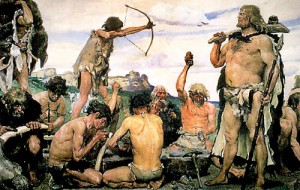Sunday Times 2
How our nose shaped the human race
We are expected to spend $45 billion on perfumes by 2018, but why are humans so obsessed with smelling fragrant?
A new book suggests that our fascination with scent started with our ancient ancestors and stretches back millions of years.
It could even be the reason why we are able to live in dense societies while living a mainly monogamous lifestyle.
The book, ‘Adam’s Nose and the Making of Mankind’, tells the story of how the sense of smell evolved from the earliest beginnings of life, and enabled humans to become the only animal on Earth to have developed a ‘smell culture.’

A new book suggests that our love affair with scent started with our ancestors and stretches back millions of years. A painting of prehistoric hunter gatherers is pictured (Viktor M. Vasnetsov/Public Domain)
Writer Professor Michael Stoddart claims that our sense of smell evolved to make human pheromones undetectable, when compared to other species
The academic, based at the University of Tasmania, Australia, claims we evolved from species living in mostly monogamous small families and that over time our ancestors’ pheromone detectors were disabled.
‘Monogamy, which underpins the security of the one-female family structure, would not have withstood the sexual pressures of communal living,’ he said.
Our distant Miocene ancestors, living over 20 million years ago, advertised their heat via smell, to ensure mating occurred.
He explained: ‘As the ancestral human line evolved, the genetic advantage of visual and olfactory advertisement of heat gradually became superseded by the benefit of ensuring that only one male would remain sexually involved with one female.’
We are the only one of 5,400 mammal species to live communally while maintaining a mostly monogamous lifestyle.
This societal structure led to fairly stable communities and cut down on in-fighting.
Professor Stoddart said: ‘Evolution has removed from humankind many instinctive reactions to smells to which other animals remain slaves, inviting our forebears to replace those smells with a rich and pervasive smell culture.
‘Removal of instinctive reactions make it possible for us to live in close proximity to many of our fellows, in relative, if not total, harmony’.
Sociability also allowed our ancestors to hunt collaboratively and reap the nutritional benefits of a meat-rich diet, setting human evolution on the path that leads to us to today.
‘Monogamy and gregariousness could co-exist only when the link between sex and smell was broken; only when the link was broken could our puny ancestors find ways to hunt cooperatively to kill the large mammals on the grassy plains of Africa,’ Dr Stoddart writes.
‘Without the link being broken, we would not be here today.
Sex and smell have been evolutionary travelling companions throughout evolutionary history.
The control of sex and the perception of smell both lie in the most ancient parts of the brain.
Over time, humans’ sense of smell evolved to only be based on the nose’s olfactory membrane, and not another structure called the ‘vomeronasal organ’ or VMO. Other mammals use both.
This change means that the human nose is connected to the rational as well as the emotional brain so we are not slaves to smells. But despite the mutation that makes pheromones all but undetectable, humans retained the ancient neural pathways in the brain formerly associated with sexual smells, which may explain our fascination with smells and perfume today.
‘As societies grew and people came to live at ever-higher densities, constant reminders of our animal origins didn’t sit well with emerging social and religious expectations, so people did what they could to remove their natural smells,’ Professor Stoddart said.
‘A 21st century Adam and Eve have made an art form out of removing their natural body smells, scrubbing, shaving and deodorising and perfuming all parts.’
The book notes that while we don’t want to smell of humans, we wear perfume to smell of other animals, by using musky scents, for example.
‘We’ve a primeval urge to smell of something, but not to smell of the humans we are,’ it says.
As our ancestors gradually evolved over a few million years, the first semblances of smell culture began to emerge, although experts are unsure when we first started to rub pleasant-smelling scents on our bodies.
‘Over the past quarter of a million years, our unique species of ape came to regard the natural body smell as having a harmful effect on emerging social structures though its ability to telegraph our animal origins.
‘As running water and soap became more common, our forefathers went to increasing lengths to remove their natural body scent, but sensing a certain social nakedness associated with having no smell, replaced it with something appealing to the nostrils.
‘That something didn’t speak of human bodies.’
The first deliberately created perfumes comprised incense, myrrh, frankincense, cinnamon, sugar cane and flowers.
The book concludes that modern society owes much to our sense of smell, which some might write off as irrelevant.
‘Nothing is further from the truth’, said Professor Stoddart.
‘Modern humans may not use their sense of smell for information about the mundane things that fill their daily lives, as do dogs and mice, but just a few molecules of scent swept along on an incoming tide of air can trigger neural pathways in the brain that once caused our ancestors to feed, fight, flee, or copulate. They take us to new levels of human fulfillment.’
© Daily Mail, London

